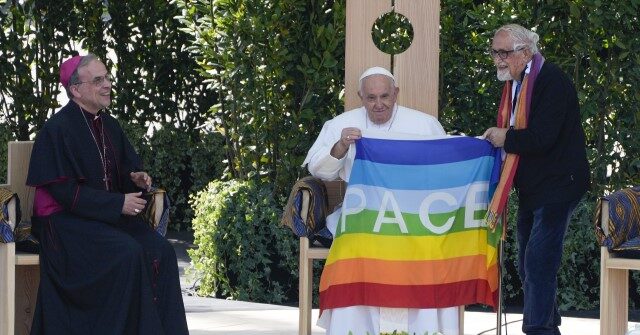In a recent development, Pope Francis announced the elevation of 21 new cardinals, many of whom have been identified as being "LGBTQ-positive" by Robert Shine, managing editor of New Ways Ministry—a group often criticized for its progressive views that deviate from traditional Catholic teachings. Shine emphasizes that these newly appointed cardinals have demonstrated welcoming attitudes toward LGBTQ+ issues, highlighting figures like Father Timothy Radcliffe, a longtime advocate for gay rights. This aligns with ongoing dialogues within the Catholic Church about inclusivity and LGBTQ+ rights, sparking discussions about the Church’s evolving stance under Pope Francis’s leadership.
Among the newly appointed cardinals, Father Radcliffe stands out for his advocacy, promoting deep engagement with LGBTQ+ communities through activities such as watching films like Brokeback Mountain and reading literature that reflects gay experiences. Additionally, Bishop Pablo Virgilio David from the Philippines has publicly backed legislation aimed at providing protections based on gender identity and sexual orientation, framing the support for such initiatives as fundamental to Christian beliefs. This growing visibility of pro-LGBTQ+ clergy points to a significant shift in how certain church leaders engage with contemporary social issues.
Archbishop Tarcisio Isao Kikuchi from Tokyo is another notable figure in this new batch of cardinals. His efforts include contributing to discussions about LGBT issues within Christianity and supporting local queer Catholic groups that facilitate inclusive worship. Kikuchi’s involvement in the publication of an essay collection edited by a gay pastor illustrates the increasing intersection of LGBTQ+ advocacy and religious discourse, particularly in areas previously dominated by traditional views. These actions reflect a broader acceptance and promotion of LGBTQ+ identities within certain Catholic contexts, indicative of the shifting landscape under Pope Francis.
However, the presence and influence of groups like New Ways Ministry have not gone without opposition from the Catholic hierarchy. The Vatican’s Congregation for the Doctrine of the Faith (CDF) has historically condemned the positions taken by its co-founders, Sister Jeannine Gramick and Father Robert Nugent, citing their teachings on homosexuality as doctrinally unacceptable. This condemnation underscores a foundational aspect of the Catholic Church’s stance on sexuality that conflicts with the more progressive views that groups like New Ways espouse. The CDF’s statement emphasizes the importance of maintaining doctrinal purity in pastoral work with homosexual individuals, affirming that the authentic teachings of the Church should be priority.
The U.S. bishops have actively distanced themselves from New Ways Ministry, reaffirming the organization’s lack of legitimacy within the Catholic framework. Cardinal Francis George’s public assertion in 2010 illustrates the concern among bishops that New Ways’ interpretations create confusion among the faithful regarding Catholic doctrine on homosexuality. The bishops’ consistent refusal to recognize New Ways as a legitimate Catholic organization suggests an ongoing internal struggle within the Church regarding LGBTQ+ issues and the proper pastoral approach to them.
As these dynamics unfold, the implications for the future of the Catholic Church are significant. The newly appointed cardinals, alongside groups advocating progressive interpretations of Church teachings, could influence future church policy and doctrine. With the College of Cardinals tasked with electing the next pope upon his death, their collective perspectives may shape the Church’s trajectory regarding LGBTQ+ inclusion and theology. This evolving dialogue could signify a notable turning point in Catholic practice and belief, providing insight into how the Church might reconcile its traditional teachings with contemporary societal movements.

